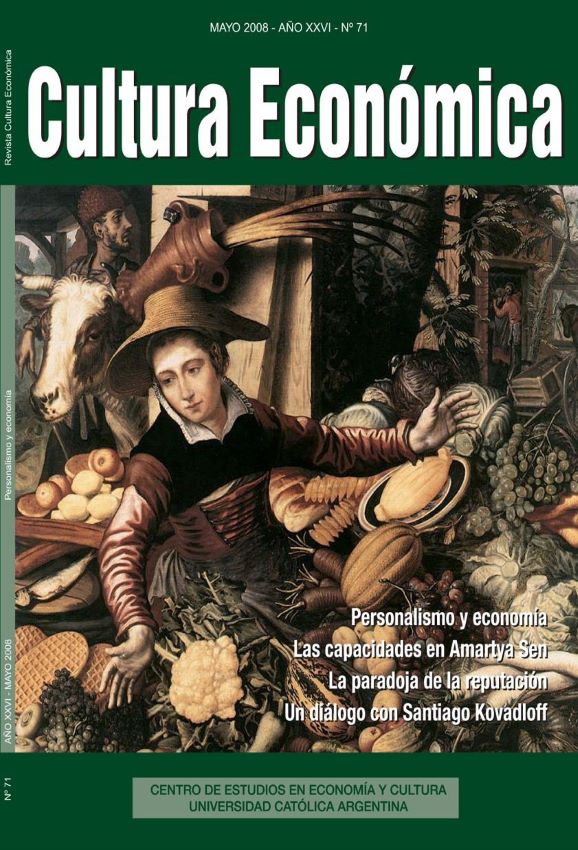The project of a personalist economy
Keywords:
subjective preferences, basic needs, ethical commitment, trust, economic democracyAbstract
Luk Bouckaert, a Professor at the Catholic University of Louvain, presents in this article the characteristics of what he calls a personalist economy. While there are a number of authors who have supported personalism, there are also attempts of many economists who not
explicitly adopting this name, could be related to this school of thought. This philosophical tradition is essentially based on a vision of the human being as a person, depending on four key assumptions: the recognition of basic needs, the ethical commitment, mutual trust
as the basis for the market economy and economic democracy as the touchstone of business ethics.
Downloads
References
Bloch-Lainé (1963), Pour une réforme de l’entreprise, Le Seuil, París.
Bouckaert, L. (1973), “Francois Perroux en de verruiming van het economisch denken” en Tijdschrift voor Economie 28(1973)1, págs. 9-37.
Bouckaert, L. (red.) (1990), Terugkeer van de ethiek, Acco, Lovaina.
Boswell, J. (1990), Community and the Economy: The Theory of Public Co-operation, Routledge, Londres.
Buchanan, J. M. (1985), “Political Economy and Social Philosophy” en Koslowsky, P. (1985).
Cheal, D. (1988), The Gift Economy, Routledge, Londres.
Clarkson, M. B. E. (red.) (1998), The Corporation and Its Stakeholders, University of Toronto Press, Toronto.
Daly, H. y Cobb, B. (1990), For the Common Good: Redirecting the Economy toward Community, the Environment and a Sustainable Future, Beacon Press, Boston.
Ellerman, D. P. (1984), “Entrepreneurship in the Mondragon Cooperatives” en Review of Social Economy 42 (1984) 4, págs. 272-293.
Gui, B. (1987), “Eléments pour une definition d’économie communautaire” en Notes et Documents 12(1987), págs. 32-42.
Hirsch, F. (1978), The Social Limits to Growth, Routledge, Cambridge.
Kolm, S. C. (1986), L’homme pluridimensionnel. Pour une économie de l’esprit, Albin Michel, París.
Koslowski, P. (ed.) (1985), Economics and Philosophy, J.C.B. Mohr, Tubingen.
Lebret, L. J. (1961), Dynamique concrète du développement, Ed. Ouvrieres, París.
Lutz, M. A. y Lux, K. (1988), Humanistic Economics: The New Challenge, Bootstrap Press, Nueva York.
Marc-Lipiansky, M. (1997), Crises et Crise, Presses d’Europe, Niza.
Maritain, J. (1936), Humanisme integral, Le Cerf, Paris.
Roy, C. (1993), Alexandre Marc et la Jeune Europe 1904-1934: L’Ordre Nouveau aux origines du personnalisme. Ph.D.Thesis, McGill University Press, Montreal.
Sen, A. (1977), “Rational Fools: A Critique of the Behavioural Foundations of Economic Theory” en Philosophy and Public Affairs, 7(1977), págs. 314-344.
Sen, A. (1985), Resources, Values and Development, Blackwell, Oxford.
Sen, A. (1985), “The Moral Standing of the Market” en Social Philosophy and Policy 2(1985), págs. 1-19.
Schokkaert, E. y Van Ootegem, L. (1990), “Sen’s Concept of the Living Standard applied to the Belgian Unemployed” en Recherches Economiques de Louvain 56(1990)3-4, págs. 429-450.
Schokkaert, E. (1991), “Economie en ethiek: een onderzoeksprogramma” en Tijdschrift voor Economie en Management 36(1991)1, pags7-16.
Vandevelde, T. (1990), “Preferenties, metapreferenties en interesses. De rol van de preferentievorming in de welvaartseconomie” en Bouckaert, L. (1990).
Downloads
Published
How to Cite
Issue
Section
License













